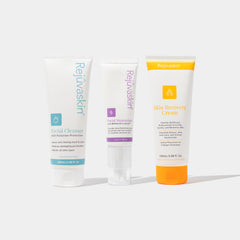Spring is a season of renewal, but for those with eczema, it can mean itchy, inflamed skin instead of sunshine and flowers. If you find that your eczema flares up every time the seasons change, you're not alone. The combination of pollen, fluctuating humidity, and environmental allergens can wreak havoc on sensitive skin. (Hussain et al., 2024).
At Rejuvaskin, we understand how frustrating springtime eczema can be. That’s why we offer dermatologist-approved solutions like Skin Recovery Cream and our Dream Skin line for littles to help you restore and protect your skin. Keep reading to discover why eczema worsens in spring and how you can take proactive steps to keep your skin calm and comfortable.
Why Does Eczema Worsen in Spring?
1. Pollen & Seasonal Allergens
Spring brings a surge in pollen, mold spores, and environmental allergens—all common eczema triggers. Eczema is often linked to allergic reactions, meaning exposure to airborne irritants can lead to increased skin inflammation, itching, and redness. (Bosma et al., 2021).
2. Temperature & Humidity Fluctuations
Spring weather is unpredictable—one day it's warm and humid, the next it's cool and dry. These fluctuations can weaken the skin barrier, making it harder for your skin to retain moisture, leading to dryness, irritation, and flare-ups (Chan et al., 2023).
3. Increased Outdoor Exposure
More time outside means increased exposure to UV rays, wind, and pollutants. Sun exposure can dry out eczema-prone skin, while air pollution can trigger inflammation, making eczema symptoms worse.
4. Stress & Immune System Changes
Stress is a known eczema trigger. The transition from winter to spring can bring changes in routine, allergy stress, and immune system responses, all of which can contribute to eczema flare-ups. (Yamamoto-Hanada & Ohya, 2024)
How to Prevent Springtime Eczema Flare-Ups
1. Build a Strong Skincare Routine
-
Gentle Cleansing: Avoid harsh soaps that strip natural oils. Use fragrance-free, hydrating cleansers instead.
-
Deep Moisturizing: Apply a thick emollient immediately after bathing to lock in moisture and protect the skin barrier.
-
Barrier Creams: Use a protective cream, like Rejuvaskin Skin Recovery Cream, which contains ceramides to strengthen the skin barrier and aloe vera to reduce inflammation.
2. Protect Your Skin Outdoors
-
Wear Protective Clothing: Choose loose-fitting cotton clothing to prevent irritation and reduce pollen exposure.
-
Apply a Barrier Cream: Before heading outside, apply Rejuvaskin Skin Recovery Cream to create a protective layer against allergens.
-
Avoid Peak Pollen Hours: Pollen counts are highest in the morning and early evening—try to limit outdoor activities during these times.
3. Manage Allergies
-
Use Antihistamines: Over-the-counter oral antihistamines (like cetirizine or loratadine) can help reduce allergic reactions that trigger eczema.
-
Try Nasal Sprays: If allergies worsen your eczema, a steroid nasal spray can help control symptoms.
-
Monitor Pollen Counts: Use weather apps to check daily pollen levels and adjust your activities accordingly.
4. Improve Indoor Air Quality
-
Use a HEPA Air Purifier: HEPA filters help trap pollen, pet dander, and dust, reducing airborne eczema triggers.
-
Wash Bedding Frequently: Wash sheets, pillowcases, and blankets in hot water to remove allergens and dust mites.
-
Control Humidity: Keep indoor humidity between 40-50% to prevent excessive skin dryness.
5. Reduce Stress to Keep Skin Calm
-
Practice Relaxation Techniques: Yoga, meditation, and deep breathing exercises can help reduce eczema-related stress.
-
Get Enough Sleep: Lack of sleep can weaken your skin barrier, making eczema worse.
-
Spend Time in Nature: Studies show that spending time in green spaces can lower stress levels and improve overall well-being.
How Rejuvaskin Helps Soothe Eczema-Prone Skin
Rejuvaskin's gentle, dermatologist-recommended products are designed to restore the skin barrier, lock in moisture, and calm irritation.
For Adults:
-
Rejuvaskin Skin Recovery Cream: Infused with ceramides and aloe vera, this cream repairs the skin barrier and prevents moisture loss, reducing dryness and itching.
For Littles:
-
Dream Skin Line: Specially formulated for children's sensitive skin, providing gentle hydration and relief from eczema discomfort.
Spring doesn’t have to mean eczema flare-ups. By understanding your triggers and adopting a proactive skincare routine, you can enjoy the season without discomfort. Rejuvaskin's dermatologist-approved solutions can help keep your skin hydrated, protected, and flare-free.
Ready to take control of your eczema? Shop Rejuvaskin's Eczema Solutions Now!
References
-
Hussain, N., Bhatti, A. N., Khan, B. N., Siddiqa, A., Azhar, S., & Zahra, T. (2024). Survey on eczema; Its perceptions and characterization. Pakistan BioMedical Journal. [link]
-
Chan, J., MacNeill, S., Stuart, B., Lo, Y., Roberts, A., Mitchell, D., & Ridd, M. (2023). Do temperature changes cause eczema flares? An English cohort study. Clinical and Experimental Dermatology. [link]
-
Yamamoto-Hanada, K., & Ohya, Y. (2024). Management of infant atopic eczema to prevent severe eczema and food allergy. Clinical and Experimental Allergy. [link]
-
Bosma, A., Ouwerkerk, W., & Middelkamp-Hup, M. (2021). Children with atopic eczema experiencing increased disease severity in the pollen season. The Journal of Dermatology. [link]





















Leave a comment